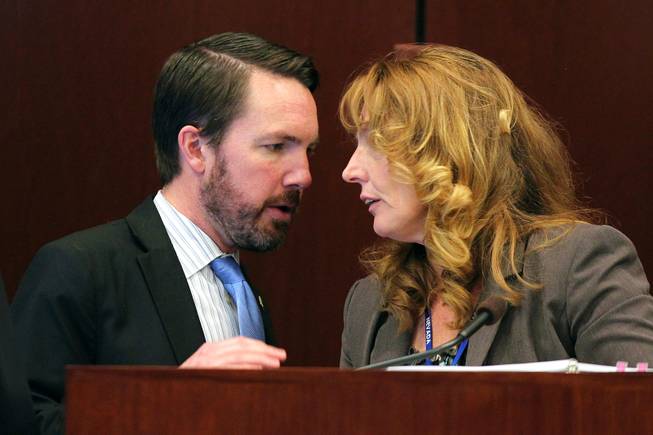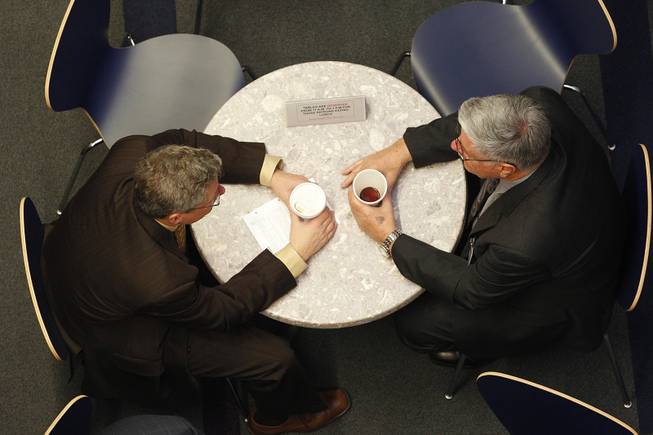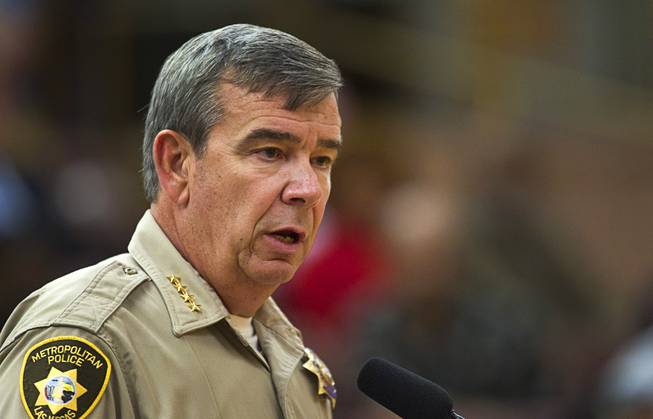Saturday, May 25, 2013 | 2 a.m.
Legislators slogged through dozens of bills Friday, turning the Senate and Assembly chambers into arenas for legislative triumph and death.
Following a lengthy day of voting, bills you might find good, bad or just plain weird are headed to Republican Gov. Brian Sandoval, meaning they now need nothing more than a signature from Sandoval to become law.
But just as many bills died because they didn’t pass by a legislative deadline that ended midnight Friday, perhaps none as spectacularly as a sex education bill from Assemblyman David Bobzien, D-Reno.
“You only have 120 days to do business with deadlines,” Bobzien said. “Bills die. That’s the way it is.”
Senate Democrats declined to consider the bill that Assembly Democrats had passed on a party-line vote, highlighting the inter-party fighting that can happen when senators need the Assembly to pass its bills and Assembly members need the Senate to pass its bills.
To achieve their goals, legislators swapped and traded in a this-for-that spate of paper-making frenzy resulting in dozens of last-minute amendments.
“We've done more alterations here than Joan Rivers' plastic surgeon,” said Assemblyman William Horne, D-Las Vegas, in a tweet.
Legislators have for the past few months nurtured their bills through the legislative process, fending off opponents, compromising with interested parties, and gathering the legislative voting blocs necessary to pass their bills. In short, they get personally invested in the legislative process.
And while legislators can rise to the occasion to debate important state social and fiscal policy, they also can spend evenings in closed meetings debating the merits and demerits of a bill about raw milk.
“It’s surreal, but I think particularly for those of us who have been here a couple of sessions, you get used to it,” Bobzien said.
While past sessions’ deadline votes have run out the clock in lengthy and contentious arguments among legislators, the 2013 Legislature ended the day at 10 p.m. with laughter in the Senate and congenial well wishes for a senator’s birthday.
Friday’s deadline is somewhat meaningless; big pieces of legislation including a major energy overhaul, a gun background check bill, a bill allowing for medical marijuana dispensaries, a gas tax, a Southern Nevada stadium study bill, and other bills are exempt from the deadline.
But that doesn’t mean major bills didn’t pass Friday either.
Here’s a look at some of the big bills the Legislature approved or killed Friday:
-
Cops
A bill to permit an increase in the sales tax to allow Las Vegas Metro Police to retain 300 officers has passed the Senate, 18-3. Assembly Bill 496 would increase the sales tax in Clark County by 0.15 percent if it is approved by a two-thirds vote of the Clark County Commission.
The department has lost revenue from the decline in sales and property tax during the economic downturn.
The measure returns to the Assembly for agreement on a Senate amendment. The bill requires periodic reports by the police department on how the money is spent. If approved by the County Commission, the added tax would go into effect Oct. 1.
The increase would expire in September 2017 unless extended.
Republicans Barbara Cegavske of Las Vegas, Don Gustavson of Sparks and James Settelmeyer of Minden all opposed the bill.
-

Sex ed
A controversial bill that would have updated and standardized sex education curriculum across the state won’t advance any farther after it died in the Senate Friday.
Supporters framed the bill as a common sense update to the state’s sex education policy, but it became mired in heated rhetoric about what exactly would be changed.
Critics had earlier warned that the bill would serve to push the agenda of Planned Parenthood, especially in regards to abortion, and would disconnect sex education from morality and community concerns.
The bill passed the Assembly on a 26-15 party line vote in April but failed to receive a vote in the Senate.
The revelation sparked an immediate outcry on social media from supporters of the bill, including Nevada chapters of Planned Parenthood, which helped craft the legislation, and the American Civil Liberties Union.
Meanwhile, Senate Democrats did not disclose who supported or opposed the bill, protecting their members from scrutiny and criticism.
Bill sponsor Assemblyman David Bobzien previously said the bill would have updated the state’s sex education law from the 1980s and put the state’s Council to Establish Standards for Public Schools in charge of developing sex education standards that would then be crafted into actual classroom policy by local school boards.
Elisa Cafferata of Planned Parenthood of Southern Nevada said the bill was only about doing something to protect the health of young people. She vowed to look for another way to pass the bill, even if it means returning during the 2015 legislative session to try again.
-

Tahoe
Legislators paved the way for a renewed agreement with California to protect the environment around Lake Tahoe.
Senate Bill 229 passed in the Assembly on a 40-1 vote and now heads to the governor’s desk.
Earlier this month, Nevada Gov. Brian Sandoval and California Gov. Jerry Brown announced they’d reached a deal to keep the two states in a decades-old compact to protect the environment around Lake Tahoe, agreeing to ease some barriers for development and mollifying the concerns of some environmentalists.
The agreement comes two years after the Nevada Legislature passed a law requiring the Silver State to break the compact if substantial changes weren't made by both the compact and the regional plan governing how the sensitive environment is developed. Environmentalists launched an effort this year to repeal the 2011 law, succeeding in convincing the Nevada Senate to pass Senate Bill 229 to keep Nevada in the compact.
-
HOAs
Assemblyman Jason Frierson, D-Las Vegas, brokered a compromise to a major homeowners’ association bill that passed Friday out of the Assembly.
The omnibus HOA bill, Senate Bill 280, passed in a 35-6 vote.
Frierson characterized the bill as a compromise among homeowners, property management groups, debt collectors, title companies, realtors, bankers and investors, all of whom sometimes have competing and conflicting interests that can and have led to litigation.
Earlier this week, it was unclear who might pay the dues for homeowners who are delinquent on payments.
The amendment adopted Friday clarifies that the homeowners’ association gets debt collection costs when a foreclosure results in a sale. That move that should help homeowners pay less in association dues, or at least avoid a higher assessment.
Frierson’s amendment may also help homeowners who are behind on payments to the extent that they’re only paying off interest while still accruing late fees, a spiral of endless debt.
The bill also makes it clear that lenders like banks will still get to repossess a home after HOAs have recouped nine months’ worth of late, unpaid association assessments.
Frierson said this should cut down on the practice by which investors would buy the lien on a home, essentially taking possession of the home for cheap.
“It doesn’t take away the bank’s interest in the home, so you don’t get a home essentially for $5,000,” he said.
-

Campaign finance reform
Candidates and elected officials will have an array of new requirements when it comes time to fill out disclosure reports after the Assembly passed a campaign reform bill Friday.
The bill lays out clearer guidelines on what constitutes a gift and under what circumstances they can be given, in addition to requiring disclosure within 72 hours of large campaign contributions received during early voting periods.
It also ups the frequency of campaign contribution reports and requires disclosure of how much cash candidates and elected officials have in the bank.
The bill was amended for the second time Friday before being passed in a 36-5 vote by the Assembly, a process that resulted in some of the toughest requirements being watered down.
The original bill, introduced by Secretary of State Ross Miller, required candidates to disclose any campaign contributions of greater than $1,000 within 72 hours of receiving the donation.
The version passed Friday raises that limit to $2,000 and requires the 72-hour disclosure only during early voting.
It also includes 17 exemptions for gifts, mostly food, drinks and trips received while acting in an official capacity, that are acceptable for candidates or elected officials to receive from lobbyists and other restricted donors, so long as they report them on their financial disclosure forms.
James Ohrenschall, D-Las Vegas, who heads the Assembly committee that took up the bill, defended the amended version and called its passage a “giant leap” in campaign transparency.
“The current lack of definitions in our statutes for donor gift has led to inconsistent and spotty reporting,” he said. “The specificity in SB49 will go along way to standardizing and improving financial disclosure at all levels of government.”






Join the Discussion:
Check this out for a full explanation of our conversion to the LiveFyre commenting system and instructions on how to sign up for an account.
Full comments policy